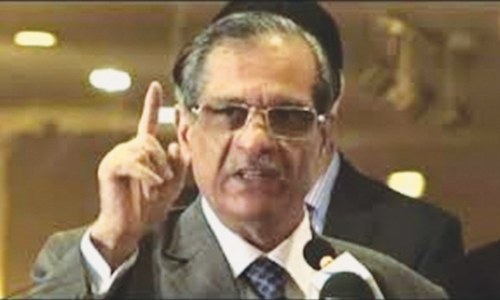LARKANA/MEHAR: Chief Justice of Pakistan Mian Saqib Nisar on Saturday expressed anger at a sessions judge and threw his mobile phone onto the desk during his visit to district courts in Larkana, asking him to leave his phone in his chamber.
While witnessing the proceedings in the courtroom of Second Additional Sessions Judge Gul Zameer Solangi, the CJP who was standing next to him asked a couple of questions and upon getting unsatisfactory reply called Larkana District and Sessions Judge Abdul Naeem Memon. The visibly angry CJP asked the district judge to ask the sessions judge as to what case he was proceeding with and under which provision.
Take a look: CJP explains why SC interferes in executive work
While leaving the courtroom, it appeared that the CJP spotted the judge’s mobile phone on the desk. He picked up the phone and threw it onto the desk, asking the judge to keep his phone in his chamber.
Rangers DG, police chief, provincial heads of spy agencies summoned in ‘missing’ persons case today
Earlier, CJP Nisar observed that all government departments needed to get their act together in order to provide relief to people. “Government apathy is evident and reflects poorly on the state of governance in the province,” observed the CJP after his visits to district courts in Larkana, a government hospital in Sukkur, Chandka Medical College Hospital (CMCH) and Sheikh Zayed Women’s Hospital, Larkana.
Some people complained to him that their relatives or family members were missing and their whereabouts were still unknown. The CJP summoned the Rangers director general, inspector general of police, and the provincial heads of Intelligence Bureau (IB), Inter-Services Intelligence (ISI) and Military Intelligence on Sunday (today) at the Supreme Court Karachi Registry.
The CJP, who was accompanied by Sindh High Court (SHC) Chief Justice Ahmed Ali Shaikh, met judges, lawyers and litigants at the district courts and witnessed legal proceedings. He also inspected case files and heard in detail grievances of people, including litigants and lawyers, and facilities available to them on the court premises.
During his visit to a judicial lock-up, CJP Nisar heard complaints and issues of the under-trial prisoners. The UTPs complained about their late production in courts and registration of false cases against them. The CJP directed judges to decide cases expeditiously in accordance with the law and asked lawyers to appear in cases.
He then asked the chief justice and registrar of the SHC to take action against delinquents and incompetent judges in accordance with law.
Visit to hospitals
The CJP also met patients, heard their complaints and expressed dissatisfaction over poor hygiene at the CMCH, Shaikh Zayed Hospital and a thalassaemia centre. He ordered the hospital management to solve the complaints and improve facilities.
CJP Nisar directed the chief secretary and health secretary to submit a detailed report on July 2 about deficiencies and demands of the hospitals.
While visiting urology unit, pathology lab and X-ray department of the CMCH, he noticed poor hygienic conditions and admonished medical superintendent Dr Ali Gohar Dahri, directing him to improve the conditions. He said: “I know about the budget and where it goes.”
Protest over slow progress in Bhutto case
During the CJP’s visit, Pakistan Peoples Party workers, headed by Larkana district president Abdul Fatah Bhutto, staged a peaceful demonstration on the Chandka bridge.
The protesters, who were holding placards, demanded speedy hearing of a reference regarding former prime minister Zulfikar Ali Bhutto case.
Representing Shaheed Mohtrama Benazir Bhutto Medical University Teachers’ Association, Dr Inayat Magsi briefed CJP Nisar about the varsity status, facilities, condition of residential quarters, faculty and administrative issues and handed over a file to the CJP who then gave it to the SC registrar.
Later, the CJP visited the police headquarters and directed Larkana SSP Shabbir Sethar to improve police quarters condition. He also addressed the high court bar and district bar associations during his visit.
Water commission
From Larkana, the CJP along with SHC chief justice reached Mehar where they were received by retired justice Amir Hani Muslim, who heads the judicial commission, chairman of the SC-appointed task force for commission’s assistance Jamal Mustafa Syed, and other senior officials.
The CJP visited Main Nara Valley Drain (MNVD) in Mehar to see the trial of provision of freshwater to MNVD through Mado and Rawat channels. He said the court would not allow any hindrance in the working of the SC-appointed judicial commission on sanitation and clean water. The SC could provide services of experts to the irrigation department for Manchhar Lake rehabilitation, he added.
Published in Dawn, June 24th, 2018

















































